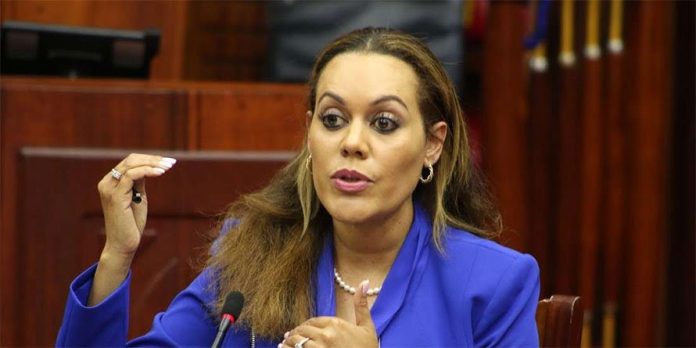BY SAM ALFAN.
Ambassadorial nominee Mwende Mwinzi will know her fate next month, in a case which she is seeking to stop legislators from forcing her to renounce her US citizenship before taking up her new post.
Justice James Makau said he will deliver his judgement on November 14.
The Judge noting has already issued a temporary order, directing that the status quo to be maintained, pending the determination of the case.
In reply to Mwinzi’s application, the National Assembly said that an approval is not a rubberstamp mechanism by the MPs.
“In this case, a specialized Committees of the National Assembly vetted the petitioner and made resolutions which were adapted by the house, it is a political process to be conducted by other arms of the government and not Judiciary,” said Anthony Njoroge, who represents the National Assembly.
For that matter, the National Assembly urged the court to decline to adjudicate the issues raised in the petition.
The MPs argue that the case is essentially a political questions and which the constitution has assigned to other political institutions for resolution.
Njoroge added that the process of appointment itself is yet to be concluded.
He told the court that the National Assembly has made its resolutions to the president, and the president must accept the resolution as advised by MPs.
Mwinzi asked the court to determine whether an Ambassador is a state officer and if no whether the issue of dual citizenship still affects her.
She wants the court to determine whether the National Assembly can grant conditional approval of nominee and also whether the petitioner has any proprietary right to the office of Ambassador.
“An ambassador or a diplomat is a representative of the interests of a sending state. Where a person has dual citizenship, the conflict of interests is certainly a reality,” added Njoroge.
Mwinzi through lawyers Tom Ojienda and Charles Omanga urged the court to consider Article 78 of the constitution that allowed dual citizenship for the first time.
“Ambassadors are not classified as state officers as alleged by the National Assembly lawyers,” added Ojienda.
He added that Mwinzi is covered in Article 260 of the constitution which indicates that ambassadors and high commissioners are not state officers.
“Mwinzi having been vetted by the parliament qualifies for an appointment and barring her violates Article 37 of the constitution and Article 47 for it went against fair administration,” added Ojienda.
Ojienda argued that Mwinzi cannot change the fact that she was born by an American mother and a Kenyan Father and since she is not a state officer, any law cannot be applied to her.
“Mwinzi’s office is not a state office and the court should find out that any law cannot be applied to her, “added the lawyer.
He said the parliament violated Article 27,47 and 260 of the constitution.
“It is our submission that Ms Mwende has successfully gone through the vetting process by the National Assembly and what remains is her deployment to the Republic of Korea,” said Ojienda.
Mwizi was nominated as South Korea ambassador by president Uhuru Kenyatta and was invited by the Departmental Committee on defense and foreign relations to attend to Parliament for purposes of being vetted which she attended in May 28.
It came to attention of the committee she holds dual citizenship. She is an American by birth and a Kenyan citizen by formalization. The committee vetted and approved her appointment in condition that she renounces her American citizenship.







